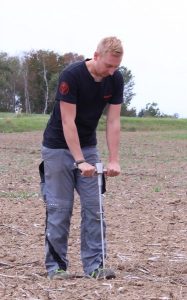24 May May 2021: Soil (Geotechnical) Engineering


Office: 843 846 2500
www.WillisSinclair.com
Info@WillisSinclair.com
May 2021
Number 87

Samuel Isaac Burdick, 4 months old
 From the Desk of Abbey
From the Desk of Abbey
Am I a Wrecker or a Builder?
by Edgar Albert Guest
A gang of men in a busy town.
With a ho-heave-ho and lusty yell,
They swung a beam and a sidewall fell.
The men you’d hire if you had to build?”
Just common labor is all I need.
I can easily wreck in a day or two
What builders have taken a year to do.”
Which of these two roles have I tried to play?
Measuring life by the rule and square?
Am I shaping my deeds by a well-made plan,
Patiently doing the best I can?
Content with the labor of tearing down?
-
The “fan” setting on your thermostats should always be set to Auto during the higher humidity months. When temperatures are cold, running the fan can help distribute the warm air throughout the house. If the fan runs during the higher humidity months, it will actually pull more humidity into the house and create problems.
- If you have vaulted ceilings, remember to keep your ceiling fans on a higher speed to keep the air moving. Humidity rises and it is best to keep one fan pulling the humidity down from the peak and another fan (if you have two ceiling fans in the vaulted room) pushing the less humid air into the peak so it creates a cycle of air that is less likely to cause mildew in places that are hard to clean. If you only have one fan, we recommend setting it to blow down in the summer so that the hot, humid air at the top is forced down where it can be cooled.
- If you have cleaners coming in to pick up bugs, clean toilets, etc. every couple of weeks, ask them to run the bath fans while they are working. That helps with air exchange so the houses have a chance to ‘breathe’.
- If you are leaving any vehicles on Brays, it is a good idea to leave a hanging bag of DampRid in the vehicles to help absorb any extra moisture even if your garage is climate controlled.
Soil (Geotechnical) Engineering
Soil Engineering or more properly, Geotechnical Engineering, is a branch of Civil Engineering that is concerned with the behavior of earth materials. Basically, it deals with the density, moisture content and composition of soil. Clearly, a home cannot be built on loose soil, but how much should the soil be packed and what if it won’t pack enough because of moisture content or the composition of soil? What happens then? The soil engineer can determine if soil is suitable for construction and if it is not, what can be done to insure the ground will support a home (or other structure) properly?
 Soil Engineering is a relatively new branch although its need was demonstrated about 850 years ago in the town of Pisa, Italy.
Soil Engineering is a relatively new branch although its need was demonstrated about 850 years ago in the town of Pisa, Italy.
In many areas of the country Soil Engineers don’t get involved with residential construction, but here in the Lowcountry, they are very important. The water table here is high and moisture content of the soil is frequently an issue. Organic matter in the soil composition can also cause density issues.
One of the specific applications of soil engineering is to insure the soil in the footer of a home is compacted enough that it won’t sink over time and cause cracks in the foundation. If a slab is poured, several locations under the slab will also be tested to make sure the support is solid.
If the soil is not compacted enough, then the soil engineer will suggest a remedial action. These could include excavation and filling with a known dense material (gravel, for example), adding pilings or other actions. Once that is complete, the soil will be retested. Once the compaction tests are satisfied, construction can begin.
 There are several methods of testing soil compaction. Probably the simplest one is a probe that is pressed into the ground. Typically, there is a meter on the probe handle that indicates how much pressure is required to penetrate the soil. There are also nuclear and electrical test devices that can be used.
There are several methods of testing soil compaction. Probably the simplest one is a probe that is pressed into the ground. Typically, there is a meter on the probe handle that indicates how much pressure is required to penetrate the soil. There are also nuclear and electrical test devices that can be used.In addition to testing soil compaction, soil engineers deal with water soaked ground. If the water table is too high, the ground will be soft and not support the weight of a home. Often shallow post holes are dug to determine the water level.
If the water table is too high, then dewatering is needed to insure the ground below a (future) home will be dry. Once the weight from the home is in place, water will not be able to get under it and cause bearing problems.
|
Next month, we will review hurricane preparation. Our hurricane season begins on June 1 and runs through the end of November.
|





No Comments